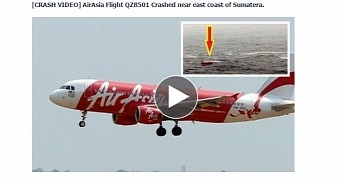Since the aviation disaster involving the AirAsia QZ8501 flight reached news outlets all over the world, it was a matter of time until cyber crooks leveraged the news to deceive users in order to direct them to scammy pages.
The message claiming to show footage of the AirAsia plane crash is currently being distributed on Facebook, since it facilitates sharing of information to an audience formed of over 1.3 billion users.
The scam, hosted at bergkids[.]com/qz8501, follows the regular steps in an online survey campaign, and after the potential victim accesses the link, they are taken outside Facebook, on a page intended to imitate one belonging to the social network.
Saving appearances is not a strength of the crooks
If the user does not realize it is a scam and still wants to watch the video, the only option available is to click on the video thumb, which prompts a share request; this enables the scam to keep on being distributed to new potential victims.
However, if the fake Facebook page is left unattended, an automatic redirect occurs, to a location that tries to imitate YouTube. In both cases, the only clickable part is the alleged video window, which requests a share on Facebook.
Careful observation is not needed in order to see through the scam, but a good way to verify is to try to access the comments section, which either describes what needs to be done to watch the footage or displays fake replies from individuals who have allegedly already seen the footage.
In most cases, however, this is just an image and regular click on it returns no response; its purpose is to entice the potential victim to share the scam to their friends.
Online surveys and affiliate marketing
Christopher Boyd from Malwarebytes says that the end goal of the deceit is for the victim to complete online surveys, for which the crooks get paid. The operation may appear as risk-free, but oftentimes this is also a tactic to harvest personal information (email address, phone number) from the victim.
In this case, download offers are also delivered, probably part of a marketing affiliation scheme, which pays the advertiser for each installation of the software.
Unless one is not able to spot the scam, the recommendation of the researcher is to stick to reputable news sources to learn the latest information on different events.

 14 DAY TRIAL //
14 DAY TRIAL // 
